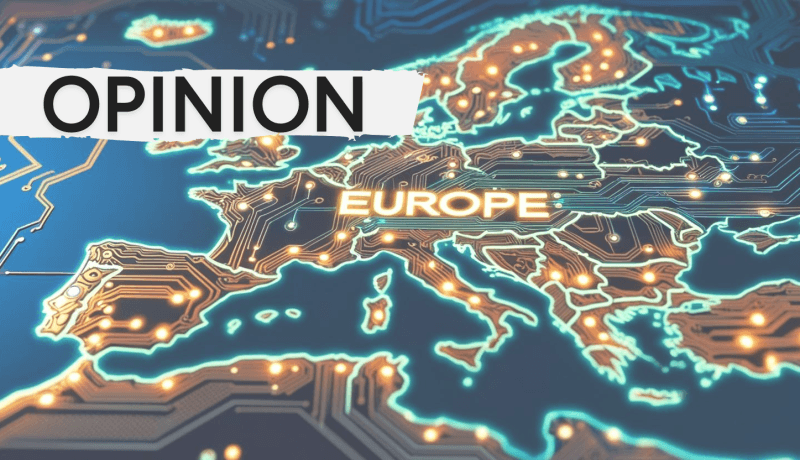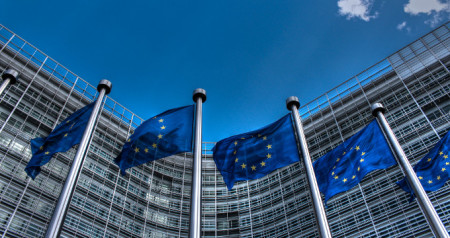Opinion
Europe’s Electronics Wake-Up Call: Onshore Electronics Production Before It’s Too Late
May 12, 2025
on
on

Wake up, Europe! You have been relying on other markets for your electronics components for far too long, and the consequences have caught up with you.
With the nonstop stream of trade tensions, tariff spats, supply chain disruptions, and geopolitical chess moves — which we have been covering at Elektor and eeNews Europe — it's painfully clear just how fragile the EU's current setup is in terms of tech independence and resilience. It's time to onshore your manufacturing. You must begin crowdsourcing innovation from within your own borders. Europe’s engineers, makers, startups, and researchers are more than capable. My colleagues and I see this every day as we collaborate with innovators on articles, design projects, learning materials, and electronic products. By fostering local semiconductor fabrication, revitalizing PCB manufacturing, supporting homegrown component suppliers, and expanding R&D in microelectronics, Europe can reclaim control over its technological destiny.

Take Amsterdam-based Philips. According to May 2025 reporting, the Dutch giant has revised its 2025 profit forecasts because of these tariffs, expecting to take a hit of €250 million or more. And Suss MicroTec, a Garching, Germany-based chip-equipment maker, is warning that these tariffs could damage semiconductor supply chains and potentially fuel economic slumps.
Such signals and warnings indicate that Europe is at a critical turning point. Instead of continuing to rely on external suppliers for its critical components, leaders need to bring more manufacturing capacity back to European soil. By accelerating investment in domestic manufacturing, Europe can begin to reduce its exposure to external trade shocks.
This isn't just about economics; it's about overall security. Europe's dependence on foreign manufacturers for core technologies presents serious risks that we could mitigate by increasing domestic production. Taking control of Europe's technological future means reducing its vulnerability to international instability.
Yes, Europe faces immediate challenges relating to production costs and market access. But this is also the perfect moment to refocus efforts on onshoring and reducing dependency on companies based elsewhere. Invest in EU-based capabilities and secure Europe's place in the technology-driven future. Start now.
Editor's Note: Have an opinion? Share your thoughts below!
With the nonstop stream of trade tensions, tariff spats, supply chain disruptions, and geopolitical chess moves — which we have been covering at Elektor and eeNews Europe — it's painfully clear just how fragile the EU's current setup is in terms of tech independence and resilience. It's time to onshore your manufacturing. You must begin crowdsourcing innovation from within your own borders. Europe’s engineers, makers, startups, and researchers are more than capable. My colleagues and I see this every day as we collaborate with innovators on articles, design projects, learning materials, and electronic products. By fostering local semiconductor fabrication, revitalizing PCB manufacturing, supporting homegrown component suppliers, and expanding R&D in microelectronics, Europe can reclaim control over its technological destiny.
The High Cost of Dependency
Recent global trade actions are putting high pressure on already strained supply chains. The United States has threatened tariffs on nearly €95 billion worth of European imports, including essential electrical equipment and machinery. These aren't just small actions and empty threats. They are impacting on European businesses of all sizes, especially in the electronics sector.
Take Amsterdam-based Philips. According to May 2025 reporting, the Dutch giant has revised its 2025 profit forecasts because of these tariffs, expecting to take a hit of €250 million or more. And Suss MicroTec, a Garching, Germany-based chip-equipment maker, is warning that these tariffs could damage semiconductor supply chains and potentially fuel economic slumps.
Such signals and warnings indicate that Europe is at a critical turning point. Instead of continuing to rely on external suppliers for its critical components, leaders need to bring more manufacturing capacity back to European soil. By accelerating investment in domestic manufacturing, Europe can begin to reduce its exposure to external trade shocks.
A Changing Landscape
Recent news indicates that the EU has begun to consider countermeasures like tariffs on US goods and export restrictions on critical materials, as Reuters has reported. The Center for Strategic and International Studies has also analyzed Europe's potential responses. But these reactions are only first steps. What's needed now is a proactive strategy to foster internal competitiveness and reduce dependence on external sources.This isn't just about economics; it's about overall security. Europe's dependence on foreign manufacturers for core technologies presents serious risks that we could mitigate by increasing domestic production. Taking control of Europe's technological future means reducing its vulnerability to international instability.
Onshore Electronics: The Path Forward
The West has been overly dependent on companies outside its borders for semiconductors and electronics components for years. And now EU-based companies are faced with reduced access to key components, an innovation deficit, and a strategic vulnerability that threatens economic prosperity. The path forward is clear: it is time to ramp up electronics manufacturing and to start crowdsourcing solutions that empower Europe-based innovators to build the electronics of the future. By bringing production closer to home, Europe can mitigate the risks of supply chain disruptions and foster innovation in key fields like embedded systems, AI, power electronics, and wireless applications — all the areas that Elektor covers closely.Yes, Europe faces immediate challenges relating to production costs and market access. But this is also the perfect moment to refocus efforts on onshoring and reducing dependency on companies based elsewhere. Invest in EU-based capabilities and secure Europe's place in the technology-driven future. Start now.
Editor's Note: Have an opinion? Share your thoughts below!
Subscribe
Tag alert: Subscribe to the tag Opinion and you will receive an e-mail as soon as a new item about it is published on our website! Read full article
Hide full article

About CJ Abate
C. J. Abate is Elektor's Director of Engineering and Content, with a wide array of technical interests spanning AI, embedded systems, and wireless applications. His multidisciplinary team comprises talented engineers from seven countries. >>



Discussion (3 comments)